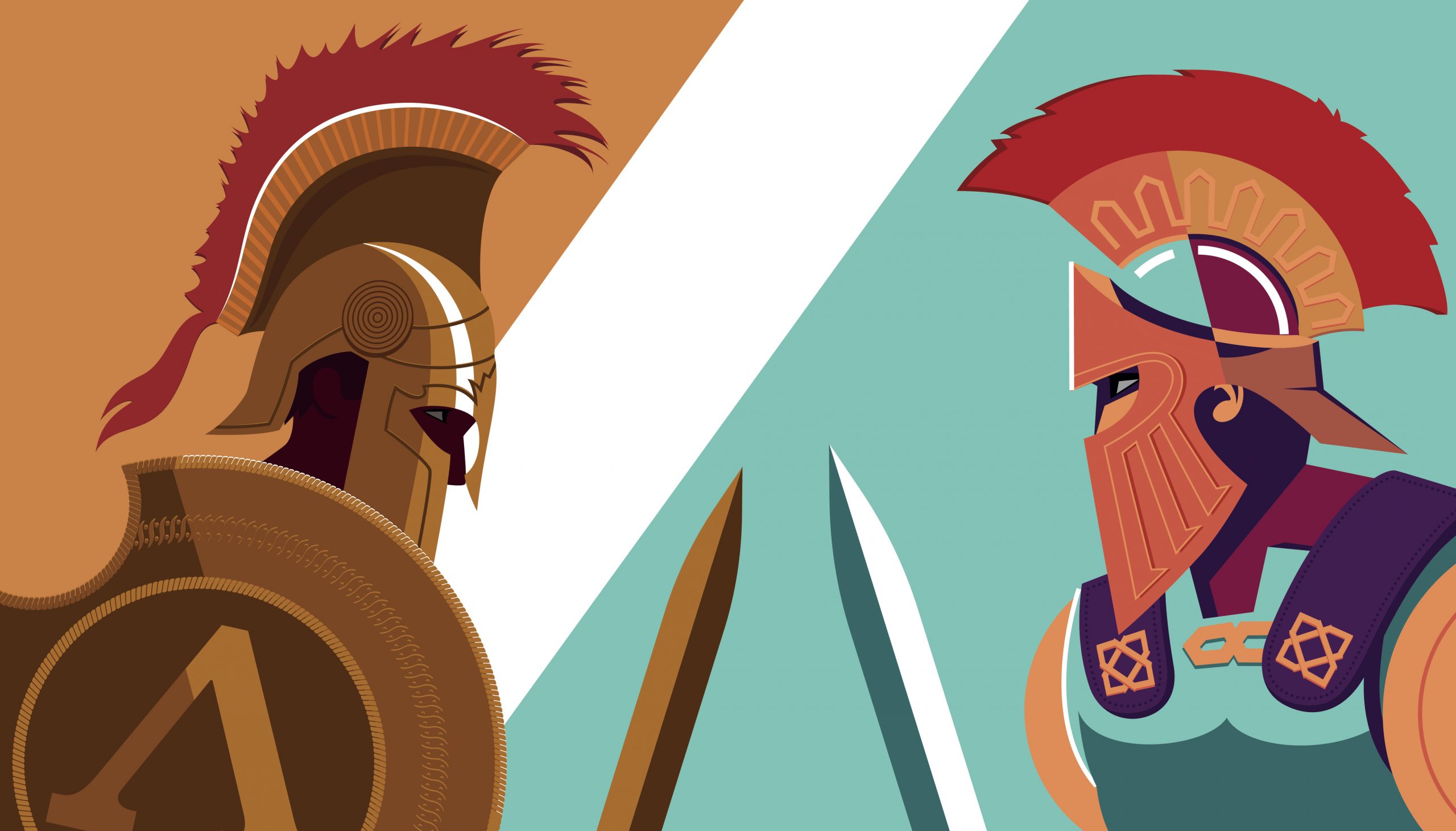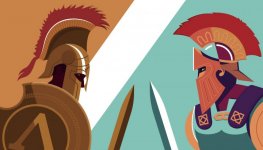Menu
Install the app
How to install the app on iOS
Follow along with the video below to see how to install our site as a web app on your home screen.
Note: This feature may not be available in some browsers.
You are using an out of date browser. It may not display this or other websites correctly.
You should upgrade or use an alternative browser.
You should upgrade or use an alternative browser.
Greek Mythology Community
What was Agamemnons role in the Trojan war?
- Thread starter acamp7
- Start date
1 - 3 of 3 Posts
knicks_fan87
Active member
Agamemnon is said to have gotten together an army of princes and they set sail for Troy only to incur the wrath of goddess Artemis.
k_tsoukalas
Administrator
Here is a good article about this!

 www.greekboston.com
www.greekboston.com

Agamemnon’s Role During the Trojan War
Learn all about Agamemnon's role in the Trojan War.
1 - 3 of 3 Posts
JOIN THE DISCUSSION AND READ OTHER GREEK INFO:
Hestia Greek Goddess Information
- voula_slat
- Greek Mythology Forum
- Replies: 2
We don't talk about Hestia much... but I just remembered that my yiayia did! I wondered why, so I researched her. Here is what I found... I think it has something to do with the fact that she was a housewife and she loved her family.. Looking at what she represents, it kind of makes sense. Here's what I found about her:
The Greek goddess Hestia was revered as the goddess of the hearth and home. In ancient Greek mythology, she was known to be a benevolent deity, who brought warmth and comfort to the home. Through her presence, she blessed the family and provided them with a sense of safety and security.
Hestia was the first-born child of Cronus and Rhea, and she was the sister of other Olympian gods such as Zeus, Poseidon, and Hades. Unlike her brothers and sisters, she did not engage in any power struggles or battles. She preferred to remain neutral and instead focused her attention on her household duties. Hestia was considered one of the most important deities, as the hearth represented the heart of the home. People would light a fire in her honor and worship her by placing offerings of food and drink on their hearth.
In ancient Greek culture, a hearth was often considered the most important part of the home. It was where food was cooked, and family members gathered to eat, share stories, and bond. Hestia's role in domestic life was crucial, and she was responsible for creating the warmth and sense of security felt within the home. Her presence was believed to bring good luck and happiness to the family.
The Greek goddess Hestia was revered as the goddess of the hearth and home. In ancient Greek mythology, she was known to be a benevolent deity, who brought warmth and comfort to the home. Through her presence, she blessed the family and provided them with a sense of safety and security.
Hestia was the first-born child of Cronus and Rhea, and she was the sister of other Olympian gods such as Zeus, Poseidon, and Hades. Unlike her brothers and sisters, she did not engage in any power struggles or battles. She preferred to remain neutral and instead focused her attention on her household duties. Hestia was considered one of the most important deities, as the hearth represented the heart of the home. People would light a fire in her honor and worship her by placing offerings of food and drink on their hearth.
In ancient Greek culture, a hearth was often considered the most important part of the home. It was where food was cooked, and family members gathered to eat, share stories, and bond. Hestia's role in domestic life was crucial, and she was responsible for creating the warmth and sense of security felt within the home. Her presence was believed to bring good luck and happiness to the family.
About My Favorite Greek Goddess Aphrodite
- paharo45
- Greek Mythology Forum
- Replies: 1
I have been researching Aphrodite, one of my favorite goddesses. I put this together based on my research.
Aphrodite was the goddess of love, beauty, and sexuality. She was regarded as the most beautiful and desired goddess in all of Greek mythology. (I think that might be why she fascinates me!)
Aphrodite's origin story is interesting. It's said that she was born from the sea foam created when the Titan Cronus cut off the genitals of his father Ouranos. She was the goddess of love, beauty, and sexuality, with her appearance at times described as pure beauty itself. She is often depicted with a flowing garment that barely covers her curves, and barefooted standing on a pedestal, highlighting her goddess-like beauty.
According to Greek legends, Aphrodite fell in love with many gods, mortals, and even animals, which often resulted in chaotic and tragic events. It is said that she helped cause the Trojan War by causing the love triangle between Paris, the Prince of Troy, and Helen, who was the wife of the Menelaus of Sparta. The story proved her power's influence and the chaos that follows her love.
Aphrodite was also a patron of love and marriage, and apparently married to the god Hephaestus, who fell in love with her beauty alongside all the Greek gods. This marriage was a politically motivated decision of Hera, whose husband Zeus had numerous affairs and that caused constant jealousy between their married life. Needless to say, Aphrodite was having none of it, with her notable lovers being Ares, Adonis, and Anchises.
Aphrodite's influence can be seen even today with countless works of art inspired by her beauty. That is why I love lear about her. She seemed to embody the feminine spirit.

Aphrodite was the goddess of love, beauty, and sexuality. She was regarded as the most beautiful and desired goddess in all of Greek mythology. (I think that might be why she fascinates me!)
Aphrodite's origin story is interesting. It's said that she was born from the sea foam created when the Titan Cronus cut off the genitals of his father Ouranos. She was the goddess of love, beauty, and sexuality, with her appearance at times described as pure beauty itself. She is often depicted with a flowing garment that barely covers her curves, and barefooted standing on a pedestal, highlighting her goddess-like beauty.
According to Greek legends, Aphrodite fell in love with many gods, mortals, and even animals, which often resulted in chaotic and tragic events. It is said that she helped cause the Trojan War by causing the love triangle between Paris, the Prince of Troy, and Helen, who was the wife of the Menelaus of Sparta. The story proved her power's influence and the chaos that follows her love.
Aphrodite was also a patron of love and marriage, and apparently married to the god Hephaestus, who fell in love with her beauty alongside all the Greek gods. This marriage was a politically motivated decision of Hera, whose husband Zeus had numerous affairs and that caused constant jealousy between their married life. Needless to say, Aphrodite was having none of it, with her notable lovers being Ares, Adonis, and Anchises.
Aphrodite's influence can be seen even today with countless works of art inspired by her beauty. That is why I love lear about her. She seemed to embody the feminine spirit.

Summary of the Nine Muses of Greek Mythology
- d_kakavouli
- Greek Mythology Forum
- Replies: 1
I've been studying about Greek Mythology and I bumped into some information about the 9 muses. I thought I would give a summary of who they are and what they represented. I feel like the Muses are often forgotten!
In Greek mythology, the Muses were goddesses who presided over the arts and sciences, inspiring creativity and knowledge in humans. There were originally nine Muses, each with her own domain of expertise. Here's a summary of who they were:

In Greek mythology, the Muses were goddesses who presided over the arts and sciences, inspiring creativity and knowledge in humans. There were originally nine Muses, each with her own domain of expertise. Here's a summary of who they were:
- Calliope: The Muse of epic poetry and eloquence. She was often depicted with a writing tablet or a scroll.
- Clio: The Muse of history. She was often depicted holding a scroll or a set of tablets, symbolizing the recording of historical events.
- Euterpe: The Muse of music, song, and lyric poetry. She was often depicted holding a flute or a double flute.
- Thalia: The Muse of comedy and bucolic poetry. She was often depicted with a comic mask, a shepherd's crook, or a wreath of ivy.
- Melpomene: The Muse of tragedy. She was often depicted holding a tragic mask and a sword or club.
- Terpsichore: The Muse of dance and choral poetry. She was often depicted holding a lyre and dancing.
- Erato: The Muse of love poetry and lyric poetry. She was often depicted holding a lyre and a wreath of roses.
- Polyhymnia: The Muse of sacred poetry, hymns, and eloquence. She was often depicted in a pensive or meditative pose, sometimes holding a finger to her lips.
- Urania: The Muse of astronomy and astrology. She was often depicted holding a globe and a compass, symbolizing the study of celestial bodies and their movements.

Accurate movies about Greek mythology?
- acamp7
- Greek Mythology Forum
- Replies: 1
I am looking for some "accurate" movies that have Greek mythological topics. I say "accurate" because how can we really even know? Many of the stories were handed down through the generations, and some even may have been lost. I guess I mean accurate according to what has been established from works that have survived.
I found this video - has anyone watched these?
I found this video - has anyone watched these?
Mythological Roots of the Olympic Games
- dimi_pat
- Greek Mythology Forum
- Replies: 1
I've recently found myself deeply fascinated with how ancient myths and legends have influenced modern traditions and events, particularly those with a global following. Among these, the Olympic Games stand out as a prime example of ancient traditions influencing contemporary world culture. I'm eager to learn more about the mythological roots of the Olympic Games and thought this would be the perfect community to turn to for insights.
From what I understand, the origins of the Olympics are deeply intertwined with Greek mythology. The games were held in Olympia, a sanctuary site for Greek gods, and featured various competitions and rituals dedicated to Zeus, the sky and thunder god in ancient Greek religion. However, my knowledge of how these mythological aspects directly influenced the establishment and evolution of the Olympic Games feels quite superficial.
From what I understand, the origins of the Olympics are deeply intertwined with Greek mythology. The games were held in Olympia, a sanctuary site for Greek gods, and featured various competitions and rituals dedicated to Zeus, the sky and thunder god in ancient Greek religion. However, my knowledge of how these mythological aspects directly influenced the establishment and evolution of the Olympic Games feels quite superficial.
Share and discuss Greek mythology!
WorldwideGreeks.com is a free online forum community where people can discuss Greek food, travel, traditions, history and mythology.
Join Worldwide Greeks here!
Join Worldwide Greeks here!
JOIN COMMUNITY FOR FREE
LOGIN TO YOUR ACCOUNT



